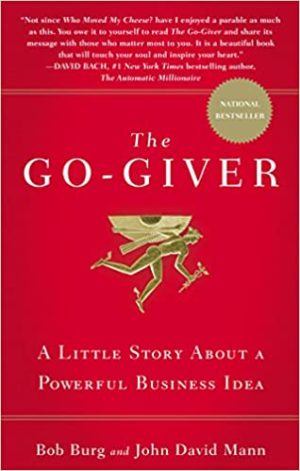
This book, The Go-Giver: A Little Story About a Powerful Business Idea, is a short, quick read. Written by Bob Burg and John David Mann in a fable style, it tells the story of person who was struggling to reach his sales quota until he finds a new way to do business. This new way is to first build personal relationships that open up possibilities for business opportunities.
You might surmise correctly from the title that the idea of a Go-Giver is in direct contrast to a Go-Getter. What we consider a go-getter is quite often a person focused on him- or herself, looking out for “Number 1.” The go-getter is often out to win at any cost. While they may speak of win-win situations, the important thing in their mind is what they are going to get out of the transaction. And life is very much based on just that – transactions, without much consideration of relationships. The Go-Giver, on the other hand, is focused first on the other person. The important thing to the go-giver is providing value to the other and developing a relationship. Transactions are the reward that might result from serving the other.
And this is the big idea of the book, that what the authors term as the “Five Laws of Stratospheric Success” can lead to business growth and success. The five laws as listed in the book are as follows:
- The First Law – The Law of Value – Your true worth is determined by how much more you give in value than you take in payment.
- The Second Law – The Law of Compensation – Your income is determined by how many people you serve and how well you serve them.
- The Third Law – The Law of Influence – Your influence is determined by how abundantly you place other people’s interests first.
- The Fourth Law – The Law of Authenticity – The most valuable gift you have to offer is yourself.
- The Fifth Law – The Law of Receptivity – The key to effective giving is to stay open to receiving.
These laws are, for the most part, in line with the Biblical commands to “one another”, that is to serve, love, help, etc. one another. And the “one another” is anyone that comes across our path, not just the ones that are deemed strategic opportunities. These laws and the “one another” commands should be guideposts for the way that we live and do business. The part of the book that is misleading is that everyone in the fable who lives out these five laws becomes a multi-millionaire. This is not realistic, and the book implies that this goal of generating great wealth is the one and only motivation for following such laws. I would submit that the true motivation should be “one anothering,” or caring for each other and providing value to all with whom we interact. Even with this major flaw, this book is an interesting and thought-provoking read.

Add your comment